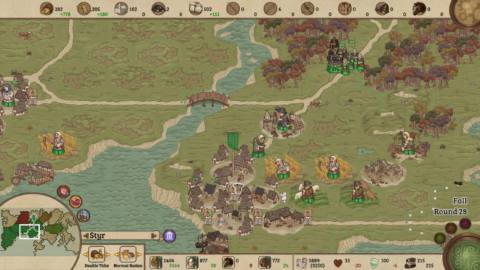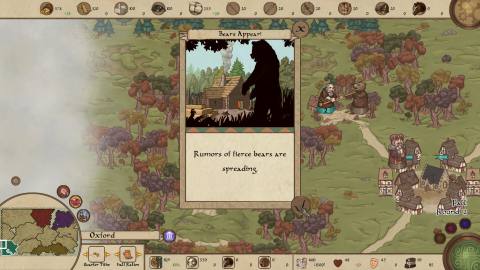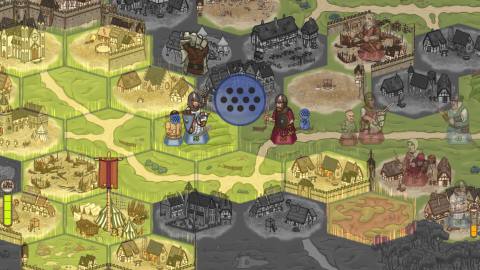Rising Lords is just the sort of game I'm most vulnerable to: historical strategy with the simple setup of a tabletop wargame and the quality of life and large numbers that are only possible when a computer does the math and moves the pieces for you. What I especially like about it, though, is that it's colorful—which might be one reason I can actually get people to play it with me.
Despite what the movies say, the medieval world was not a drab palette of mud and polished steel. It was colorful and wild and flamboyant and made of rich fabrics and painted armors, and Rising Lords gets that. The rich earth and bright gem tones give off the effect of an actual medieval tapestry or fresco painting, with fantastic designs inspired by things like the Lewis chessmen.
Sadly, whatever blessing was given to the world was not given to the user interface, which is, while not without charm, either too sparse and lacking in explanation or cluttered with unimportant detail. As a strategy game fan, however, I am never stopped by an insufficient user interface. I am sometimes encouraged by it, perhaps to the detriment of myself and the genre, but it's worth bearing with in the case of Rising Lords, which is just the kind of easily-to-digest strategy game I'd love to see more of.
The core task in Rising Lords is managing growth in your little towns. Every few hundred citizens gives you a new Peasant pawn that can be assigned to fields, forests, mines, and workshops. Most of them have one job: Get more food, sooner. More food means better fed peasants, meaning a population that both grows faster and is more willing to stomach taxation. I quite liked the game of this, making sure that you had excess food, but not so much that you couldn't build houses to take care of them. Not just because houseless beggars will impoverish your settlement long-term, but because peasants cutting wood and stone and building new houses can't work the fields to build up a food store for the winter.
A population excess is definitely good for one thing: Having a war. Each soldier recruited draws directly from that population count, and you might not have enough equipment for proper soldiers—you probably don't, in fact, because you'd have to get a proper blacksmith up and running to forge equipment—but that's okay! You, like me, like the medieval lords of old, will just bulk out your forces with a levy of peasants not otherwise gainfully employed. Arm them with whatever they have and get to conquering.

Keep it simple, sirrah
It’s simple enough that you don’t have to play it for a dozen hours to understand how to play it well.
Part of the early game in each match is a scramble for territory. Some of the independent provinces near your start won't have a town militia, leaving them ripe pickings for expanding your demesne. They might even have valuable unworked resources: Stone quarries let you upgrade towns to higher levels and build durable walls, while iron mines can turn your army from those unequipped peasants to levy of proper spearmen in no time. Perhaps you'll even luck out and find a silver mine.
None of it is deeply complex. It's not Crusader Kings or some other 4X with a detailed tree of unit types, upgrades, and such. Every kind of unit you can ever make and building you can produce is right there at the start of the game. Rising Lords is calibrated more toward the sentiments of board gamers, wargame grognards, and the like than it is toward the larger demographic of mechanics-forward, action-oriented players. It's a streamlined version of a more simulation-and-reality-based game model: One where key metrics like food and population matter more than abstract technology or industry incomes.

It's possible you've heard me say things like this before. Not long ago I wrote about a tabletop wargame that Rising Lords very clearly draws from, the remake of an '80s classic that was Fief: France 1429.
These kinds of single-evening digital board games are a delight we should all be enjoying together more often.
What makes those old wargames so much fun is what makes Rising Lords good: It's simple enough that you don't have to play it for a dozen hours to understand how to play it well. The mechanics don't get in the way of the wheeling and dealing and literal horse-trading. You and a few friends, whether in-person via LAN play or online, can pick up Rising Lords and start playing it both competitively and successfully pretty quickly.
That really sinks in as you dig into the wars proper. Armies that meet in the field or on attack spread out for a hex-based battle using the same game map you build towns and farms on. The combat is approachable stuff: Terrain bonuses and straightforward unit-counters-other-unit. Simple enough that anyone who watched Braveheart immediately understands it but complex enough to allow for some strategic surprises. Your swordsmen might be a strong counter to my spearmen, but camping out in a forest makes me a real pain to dislodge. Your cavalry might be good at charging my archers, but I've used my general's XP to purchase some cards that let me place defensive stakes to keep horsemen off my back.

The 1.0 release of Rising Lords on January 18 brought with it a multi-mission campaign that follows a young noble's rise to power in an increasingly unstable fictional medieval world. I took some time with the first few missions and I expect it'll be the kind of thing I string out over the next five or six months, dropping into the adventure for short breaks between other, longer games.
Simplicity is an often-polarizing element in modern games, especially strategy games, that can be seen as a realm where complex system mastery is required of everything that wants to be a genre great. I think that's a poison on the genre that pushes out perfectly enjoyable niches of game design, especially simple, accessible competitive multiplayer.
If you and friends enjoyed the recently-released social 4X Stellaris Nexus then I'd encourage you to check out Rising Lords as well. The designers there would almost surely agree with me: These kinds of single-evening digital board games are a delight we should all be enjoying together more often.






